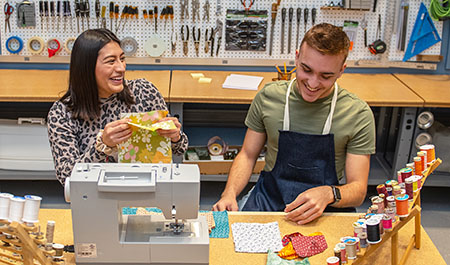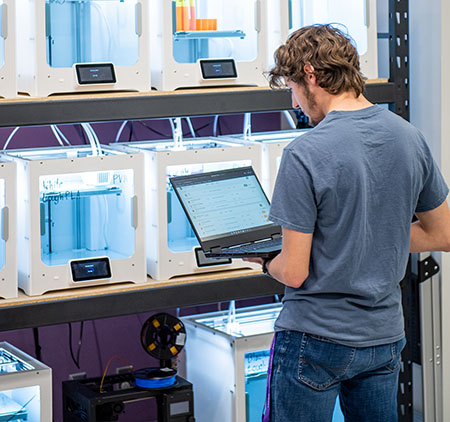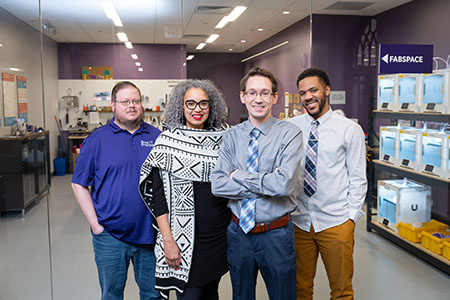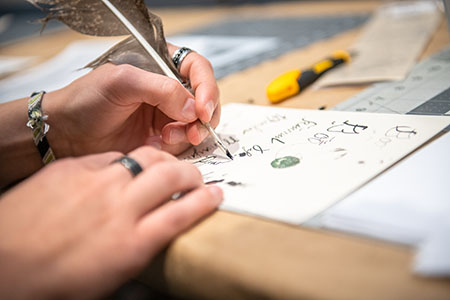Sunderland Foundation Innovation Lab offers a space of exploration and creativity
Where dreams come to life
By Lindley Lund
Jarrett Lippert had always wanted a cup holder.
The 15-year-old has spastic quadriplegic cerebral palsy and uses a wheelchair — one that lacked a cup holder.
So, when Lippert visited Kansas State University’s Sunderland Foundation Innovation Lab in Hale Library as part of Manhattan-Ogden USD 383’s STEM Camp, one thing caught his eye: the 3D printers.
A few days later, a self-designed, royal purple cup holder adorned with a Powercat was attached to his wheelchair, fresh from the lab’s 3D printers.
“It’s a really cool cup holder, and it feels like I really accomplished something,” Lippert said. “I’m grateful to the lab for helping me accomplish that dream of a cup holder.”
Lippert’s story is exactly what Jeff Sheldon, innovation lab associate director, had in mind when the idea for the lab was initiated in early 2018. K-State wanted to offer a state-of-the-art facility — the first innovation lab of its kind in the state of Kansas — with the latest innovative technology and tools for anyone in the community to explore and unleash their greatest creativities.
The lab helps K-State offer new engagement, learning and research opportunities for the university and community alike.
“People can come to the lab and be masters of their own domains,” Sheldon said. “They can fail as many times as they need to be able to succeed, and they can learn at their own paces.”
The innovation lab opened its doors in 2021 as part of the restoration and recovery following the Hale Library fire. The Sunderland Foundation gifted K-State with $2.5 million for the creation of the lab, which is a collaboration between the Division of Information Technology and K-State Libraries.
A facility for all
 From an artificial intelligence studio to a recording studio, the innovation lab offers many resources that are used by researchers, students, community members and local organizations.
From an artificial intelligence studio to a recording studio, the innovation lab offers many resources that are used by researchers, students, community members and local organizations.
“The lab provided all the materials and equipment the students needed,” said Hannah Sullivan, a K-State College of Education senior in music education who assisted with USD 383’s STEM Camp focused on science, technology, engineering and mathematics.
The students in the camp, thanks to the equipment and materials from the lab, had the opportunity to take apart commonly used items and recreate them into something new, such as transforming a space heater into luggage that also had the ability to heat up food.
“The lab encourages critical thinking and problem-solving opportunities,” said Gerae Cragg, a USD 383 teacher who helped teach the STEM Camp. “It helps develop those different skills that students might not get the opportunity to use every day.”
It’s that kind of creativity and imagination that the innovation lab staff members hope everyone unleashes when they enter the lab, regardless of their age.
“I think when you get older you kind of lose that for a variety of reasons. For a lot of people, it’s that they don’t have the tools and they don’t have the space,” said Tara Coleman, programming services coordinator for the lab. “We want to make that accessible. We want to open the lab up and give people that opportunity to explore and fix things on their own.”
Advancing research and studies
For years, Melinda Cro searched for an immersive lab experience to advance her students’ research and linguistic development. As a K-State professor of modern languages, she wanted to create an opportunity for students to fully explore the French language and immerse themselves in early modern culture in their own ways, such as understanding a 17th-century playwright’s cultural and linguistic influence today.
Cro discovered the innovation lab and realized it was everything she needed. In the lab, her students had free rein to select resources that would benefit the research questions they had chosen to pursue. In using everything from the makerspace and Liquid Galaxy display to the 3D printers and One Button+ Studio, Cro’s students researched and produced final projects that were anything but the traditional paper.
needed. In the lab, her students had free rein to select resources that would benefit the research questions they had chosen to pursue. In using everything from the makerspace and Liquid Galaxy display to the 3D printers and One Button+ Studio, Cro’s students researched and produced final projects that were anything but the traditional paper.
“Having a world-class, immersive lab that helps students to explore and prepare for a public engagement that pushes an interrogation of the medium of research and communication is invaluable,” said Cro, also the College of Arts and Sciences assistant dean of students. “Spaces like this are imperative and help us to stretch our research and pedagogy in ways that prepare students to be accomplished and creative problem-solvers in the long term.”
The resources in the lab also allow students to advance their studies beyond what they learn in the classroom.
“The lab equips students with lifelong learning tools and experiences by offering an opportunity to acquire technological skills and expertise that frequently go beyond the capacity of the individual departments and colleges,” said Joe Mocnik, dean of K-State Libraries. “Transferable skills are probably the most important elements for long-term success and that is where our effort to enhance the technological literacies has been most successful.”
Jake Roderick, freshman in fashion studies in the College of Health and Human Sciences, uses many of the technologies, including the 3D printers, makerspace and artificial intelligence studio.
“Having these resources available allows me to learn and have access to many tools that I did not realize could be applied to fashion,” Roderick said. “The innovation lab can really be applied to almost any major. There are so many tools that can help inspire innovation in anybody.”
See page 38 to learn how other fashion studies researchers are using the innovation lab.
Kansas is the clientele
The influence of the lab goes beyond the K-State Manhattan campus.
Heather McCrea, the Kenneth S. Davis professor of history, and Traci Brimhall, poet laureate of Kansas and K-State professor of English, conducted research on the Winfield State Training School, a now-closed mental health institution in Winfield, Kansas.
The research was presented in a pop-up exhibition in the Winfield Public Library, adorned with large-scale images from the Winfield State Training School that were created in the innovation lab.
“The tools and insights of employees and faculty at the Sunderland Foundation Innovation Lab were instrumental in transferring seemingly esoteric historic ephemera into meaningful visuals to draw public interest in lesser-known narratives of the past,” McCrea said. “Professor Brimhall and I are grateful for the creative leadership offered by the lab to transform ideas into visual tools to bring history into dialogue with the present.”
The lab’s leaders have the goal to continue connecting with people across Kansas to better shape K-State’s community outreach and help support small businesses.
 The work aligns with the university’s Economic Prosperity Plan and K-State 105 initiative to engage with all 105 counties in Kansas.
The work aligns with the university’s Economic Prosperity Plan and K-State 105 initiative to engage with all 105 counties in Kansas.
“The lab is a place where you can literally walk in with an idea and walk out with a product,” said Jahvelle Rhone, lab media coordinator. “We help people bring their ideas to fruition.”
Innovation lab leaders also hope to strengthen the university’s strategic plan to become the next-generation land-grant university by building partnerships with other higher education institutions who want to provide similar services.
“I try to always remember that Kansas is the community we serve,” Sheldon said. “Kansas is our clientele and we want it to be a place for everyone.”
The lab makes connections beyond the state and has been involved in virtual events featuring national agencies.
From August to December of 2022, the lab hosted a location for a virtual national security innovation training by the Defense Advanced Research Projects Agency from the U.S. Department of Defense. During these events, researchers had the opportunity to come together to watch a high-quality viewing of the training.
“I see how the seed that the Sunderland Foundation Innovation Lab planted is sprouting into a major focus to put our institution on the leading edge of academic evolution,” said Gary Pratt, K-State vice president for information technology and chief information officer.
Whether it’s a national security training, a cross-century cultural analysis project or K-State cup holder, the innovation lab is here to support all Kansans, and Americans, in whatever they may set their minds to.
“It’s a great opportunity for anyone who has a dream and wants it to come to life,” Lippert said.